Building a culture of impact
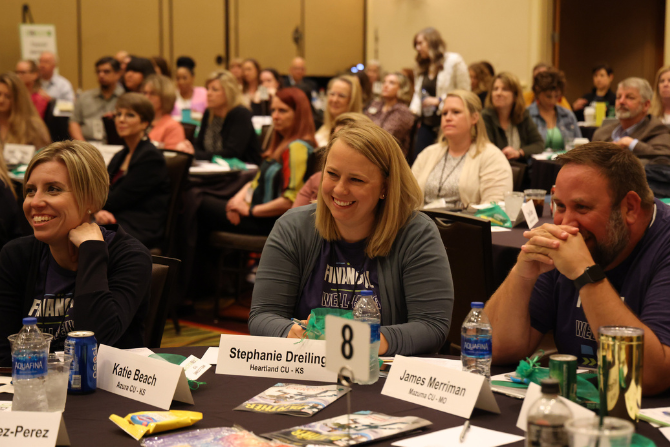
“How are we making an impact in people’s lives?” is a question asked daily at credit unions, and one that drove two State Foundations to develop Financial Well-being Task Forces.
Heartland Credit Union Charitable Foundation’s Executive Director, Andrea Robinson Fuentes, was frustrated. As the philanthropic arm of a multi-state league, her organization had a remit to improve the lives of millions of consumers—but she was struggling to find alignment.
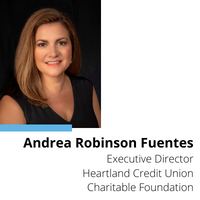 “Our member credit unions are very diverse,” Fuentes said. “Geography, demographics, asset size, resources, financial need indicators. Often the only common denominator is mission.
“Our member credit unions are very diverse,” Fuentes said. “Geography, demographics, asset size, resources, financial need indicators. Often the only common denominator is mission.
“In that environment, talking to credit unions one at a time doesn’t deliver the insights necessary to tackle the giant elephant we’re all committed to: improving financial well-being for all.”
The solution, Fuentes realized, was relatively straightforward: “We felt if we could bring people together who are already making financial health inroads and focus on tackling an issue cooperatively, we could make some real progress. What we needed was a task force.”
With CUFinHealthTM22 on the horizon, Fuentes and her team saw the ideal opportunity to launch—and test—that idea.
Inspiring action right out of the gate
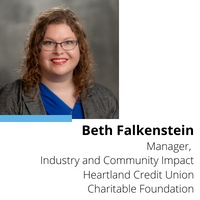 “CUFinHealth was a great starting point,” added Beth Falkenstein, Heartland Credit Union Association’s manager of industry and community impact. “How often are you in the same room with people from around the country, all focused on that big idea of financial well-being?”
“CUFinHealth was a great starting point,” added Beth Falkenstein, Heartland Credit Union Association’s manager of industry and community impact. “How often are you in the same room with people from around the country, all focused on that big idea of financial well-being?”
Falkenstein emphasized that while CUFinHealth was a catalyst, the task force would have to grow and maintain momentum beyond that one event. “We know we can’t fix anything in a year or two, but if we can build a culture of intentionally valuing and putting resources toward financial well-being in our region, we’ll make an impact—there’s going to be a ripple effect.”
The ripple began sooner than anyone expected.
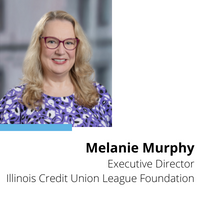 “I heard about the task force and thought it was a great idea,” said Melanie Murphy, executive director for the Illinois Credit Union League Foundation. “I’ve always wanted more of our credit unions to attend CUFinHealth and tying it to a newly formed task force was a great way to do that.
“I heard about the task force and thought it was a great idea,” said Melanie Murphy, executive director for the Illinois Credit Union League Foundation. “I’ve always wanted more of our credit unions to attend CUFinHealth and tying it to a newly formed task force was a great way to do that.
“With Andrea’s collaboration and support, I duplicated pretty much everything her team was doing. It’s the cooperative movement in action!”
Establishing goals
While serving unique credit unions, with individual needs, in distinct parts of the country, both Fuentes and Murphy continued to collaborate leading up to CUFinHealth.
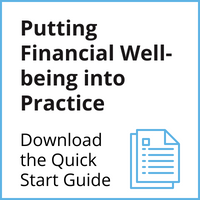 After sourcing volunteers from a broad array of credit unions, both task forces used the Foundation’s Financial Well-being Quick Start Guide—developed in partnership with Filene—to help establish goals.
After sourcing volunteers from a broad array of credit unions, both task forces used the Foundation’s Financial Well-being Quick Start Guide—developed in partnership with Filene—to help establish goals.
“We challenged our respective task forces to go to CUFinHealth, listen, participate and look for trends,” said Fuentes. “We wanted them to come back with one idea, focused on one issue, that could be replicated at credit unions everywhere.”
“The key was relevance,” added Murphy. “By focusing on one theme, issue or output, we could set the task force up for success. Our member credit unions could see the relevance and potential.”
 For Heartland’s task force, ensuring the financial health and well-being of credit union employees was a clear priority.
For Heartland’s task force, ensuring the financial health and well-being of credit union employees was a clear priority.
“We realized that our employees are at the same level of coping and just as vulnerable as our members—that they’re facing the same barriers,” said Falkenstein, who facilitates the Heartland task force.
“The world is complicated, finances are complicated, systems are broken. There’s no magic once you’re hired at a credit union—sometimes we forget that because we’re so caught up serving other people. We need to serve ourselves too.”
In Illinois, the task force focused on ways to make impactful programs/projects more accessible.
“We’ve helped our member and affiliated credit unions by underwriting the cost of programs like Enhanced FiCEP or Lead Like an Ally in the past,” said Murphy. “Now we’re looking at similar models for sharing financial wellness information and providing ICU Foundation products or services. I love the opportunity this presents for credit union collaboration.”
Next steps
Since the event in April 2022, both task forces have—independently—met monthly to develop scalable, replicable plans to achieve their own objectives.
Fuentes noted that the Heartland task force has prioritized understanding barriers first. “I love our monthly meetings,” she said. “I have ah-ha moments every single time. Consider the power of language, for example. Have we assumed our younger employees know what an emergency fund is? Have we been presumptuous about how people define being financially well?
“A lot of this is cultural and longitudinal. It’s all on a spectrum. Our task force is exploring how we can find and support credit union employees where they’re at. That’s the first of many next steps.”
More information: Download the How-To guide.
Explore how your credit union can make an impact by registering to attend the 2023 CU FinHealth Conference.
